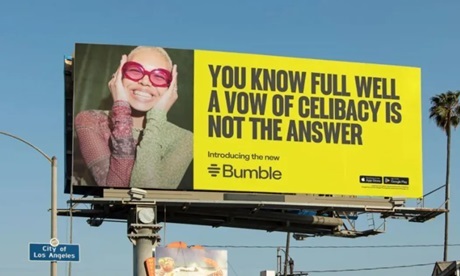Sian didn’t set out to become celibate – at least not to begin with.
At the tail end of 2021, freshly single and out of a 100-day lockdown, the 27-year-old was in a delicate headspace.
Tapping into the sex-go-round
For Sian, the dating apps had become an obsessive regime in curating profiles and swiping endlessly. Finding genuine connections felt like a futile attempt.
“What I probably needed was a therapist, but Bumble was free.”
Navigating the outside world again was odd. Navigating the dating world again was intense.
“The apps are almost designed to facilitate hooking up; like, sex is always on the table, it’s a given, it’s an unspoken goal, it’s implied unless stated otherwise.
“I was going through a breakup under the strangest circumstances, just cooped up at home with nothing but my thoughts, then suddenly we were outside again.
“I was so sick of feeling sad and helpless. I was keen to get through those feelings faster, so I was just doing whatever.”
Sian began seeing a series of men post-lockdown and the sexual freedom felt exciting at first. Then, a few months passed, and she realised something was wrong. The problem was sex.
“I thought it was giving me this adrenaline rush but actually it was just giving me deep anxiety, meeting people, getting intimate too quickly, mixed messages, ghosting, rinse and repeat.
“I deleted the apps for a few weeks for mental clarity and naturally stopped seeing these men too. It was just meant to be a short break from dating and casual sex, but then it turned into almost a year of intentional celibacy. It was like a cleanse; emotionally, mentally, physically, everything.”
Choosing celibacy
Celibacy might sound like an unconventional path for a 20-something-year-old, but disillusionment with hookup culture and increased sexual autonomy has led more and more young people to pursuing it.
Some pursue it for a few weeks, others a few months, or a few years.
On TikTok, intentional celibacy has become a trend; as of May 2024, the #celibacy hashtag has more than 200 million views, and religion is hardly mentioned by those practising it.
Earlier this month, an anti-celibacy ad campaign from Bumble also caught some flak online.
It began with a commercial showing a woman attempting to “swear off dating” and become a nun, only to abandon her convent after drooling over a sexy shirtless gardener and receiving an illicit phone loaded with the Bumble app.
Shortly after the commercial aired, global billboards with taglines like ‘You know full well celibacy is not the answer’ and ‘Thou shalt not give up on dating and become a nun’ were unveiled.
A TikTok video criticising the campaign caught the attention of model and actor Julia Fox, who lived a former life as an 18-year-old dominatrix in Manhattan.
Fox commented under the video: “2.5 years of celibacy and never been better tbh,” and hundreds replied echoing similar sentiments.
“Celibacy and decentring men is lifechanging,” one said. “Eight years celibate, no drama, no hate, I’m finally loving every second of life,” said another.
Sexual autonomy
Women’s sex and libido coach Sofie Louise says the trend in young people choosing celibacy could be down to an increased awareness of sexual autonomy.
“I think the motivations are changing and people feel like they have more choice around whether they’re having sex or not, and they feel more validated in those choices and find community in those choices which is amazing.
“There are still a lot of stereotypes that exist that try and dictate people’s sexual behaviour.
“There’s the idea that women are sluts if they have too much sex or prudes if they don’t have enough sex, that men should love sex and want to have it all the time and all of these generalisations.
“I think that slowly, while they still exist, they’re being broken down and scrutinised more and more, and people’s realities are being talked about more and more, so people feel like they have autonomy to make their own choices.”
Louise says a lot of people might approach a period of celibacy in the same way they might approach something like Dry July. Read more
- Jogai Bhatt is a digital lifestyle and entertainment journalist at Radio New Zealand
